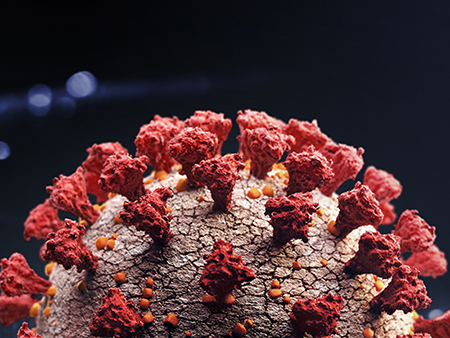 Maryland-based Altimmune Inc. has submitted an Investigational New Drug application to the U.S. Food and Drug Administration to commence a Phase 1 clinical study of its single-dose intranasal candidate.A COVID-19 vaccine candidate that underwent extensive preclinical testing at the University of Alabama at Birmingham this spring and summer is poised for clinical testing to begin in December.
Maryland-based Altimmune Inc. has submitted an Investigational New Drug application to the U.S. Food and Drug Administration to commence a Phase 1 clinical study of its single-dose intranasal candidate.A COVID-19 vaccine candidate that underwent extensive preclinical testing at the University of Alabama at Birmingham this spring and summer is poised for clinical testing to begin in December.
Maryland-based Altimmune Inc., a clinical stage biopharmaceutical company, has submitted an Investigational New Drug, or IND, application to the United States Food and Drug Administration to commence a Phase 1 clinical study of its single-dose intranasal COVID-19 vaccine candidate, AdCOVID.
The UAB preclinical study for Altimmune showed that AdCOVID stimulated a broad immune response, including both systemic immunity — as shown by neutralizing antibodies in the blood — as well as local immunity, featuring mucosal IgA and resident memory T-cells in the nasal cavity and respiratory tract.
The COVID-19 pandemic — with more than 1.4 million global deaths — has highlighted the urgent need for effective preventive vaccination to reduce the burden and spread of SARS-CoV-2, the virus that causes COVID-19. Intranasal vaccination is an attractive strategy, as the nasal mucosa represents the first-line barrier to SARS-CoV-2 entry before viral spread to the lung. In contrast, current intramuscular-formulated vaccine candidates elicit systemic immunity without conferring mucosal immunity.
“It’s not widely known or appreciated that nasal mucosal immunity may be essential in preventing the spread of the SARS-CoV-2 virus to other individuals by stopping replication and transmission of the virus at the site of infection — the nose and respiratory tract,” said Fran Lund, Ph.D., leader of the UAB preclinical work, and the Charles H. McCauley Professor and Chair for the UAB Department of Microbiology. “Several recent studies have shown that, in the absence of mucosal immunity, the nasal cavity may become a reservoir for the coronavirus, particularly in children, potentially allowing for disease transmission even after an intramuscular vaccination.”
“A vaccine that prevents transmission by children would allow them to return to school and their parents to return to work,” Lund said. “We are excited to collaborate with Altimmune on the advancement of this important next-generation vaccine and look forward to seeing data from the upcoming clinical study.”
Vipin Garg, Ph.D., president and chief executive officer of Altimmune, said, “We’ve made exceptional progress advancing AdCOVID and are on track to begin a Phase 1 clinical study this year, with a data readout anticipated in the first quarter of 2021. While the progress being reported with current vaccines is very encouraging, many in the scientific and medical communities agree that there is continued need for next-generation vaccines that offer significant enhancements.”
 Fran Lund, Ph.D.“AdCOVID,” Garg said, “has the potential to provide many benefits not offered by current vaccines, including simple intranasal administration, the ability to be transported at room temperature and conveniently stored in refrigerators for years, and the stimulation of nasal mucosal immunity with the potential to provide sterilizing immunity and block transmission of the SARS-CoV-2 virus.
Fran Lund, Ph.D.“AdCOVID,” Garg said, “has the potential to provide many benefits not offered by current vaccines, including simple intranasal administration, the ability to be transported at room temperature and conveniently stored in refrigerators for years, and the stimulation of nasal mucosal immunity with the potential to provide sterilizing immunity and block transmission of the SARS-CoV-2 virus.
“In addition to testing in adults, our IND included a preliminary proposal for evaluation of children as young as 2 years of age, and we look forward to further discussions around our pediatric program with the FDA in the near future.”
In a recent pre-IND meeting with Altimmune, the FDA agreed to the overall Phase 1 study design and patient population, as well as plans for manufacturing and product testing of AdCOVID. The FDA also confirmed that additional nonclinical studies were not required and that the toxicology data previously submitted and reviewed for Altimmune’s NasoShield™ and NasoVAX™ intranasal vaccine candidates support the clinical development of AdCOVID, with no additional toxicology studies required before initiation of the Phase 1 trial.
Last spring and summer, 24 researchers from six labs at UAB — all working under UAB COVID-19 safety protocols — and eight researchers at Altimmune tested the potential COVID-19 vaccine in a collaboration that was announced March 30. “The goal,” Lund said at the time, “is to get the data to Altimmune as rapidly as possible, so they will use the information gained from the preclinical study to design their clinical trial in people.”